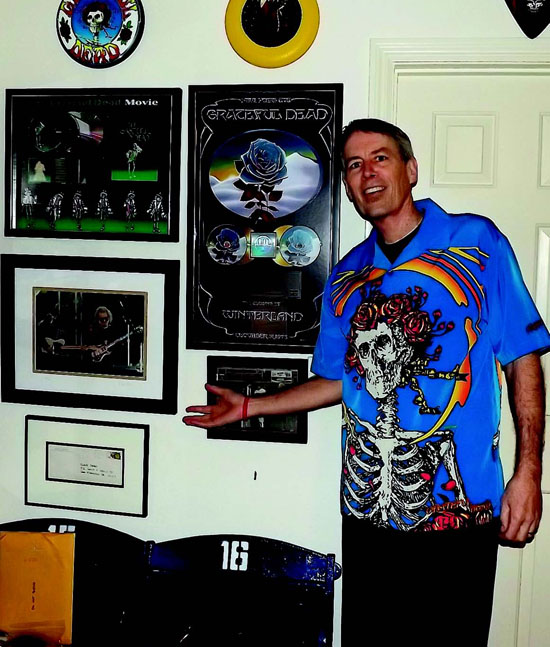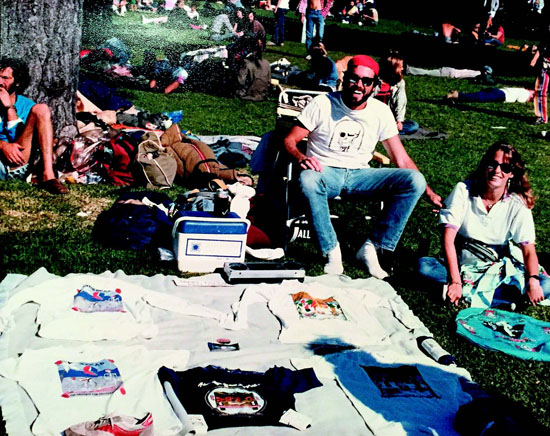 |
|
|
Tom Stack admires his Grateful Dead Platinum record commemorating the 1978 closing of San Francisco's Winterland Ballroom. Photo Cathy Dausman
|
|
|
|
|
|
Tom Stack refuses to be penned in, either literally or figuratively. "I'm into music," Stack said, but cautioned, "Don't pen me in as a Deadhead." This from a man who followed, then worked with the Grateful Dead for nearly two decades.
 "Most realtors have another life," Stack explained when recounting his story, but few can match the Lafayette man's first career.
"Most realtors have another life," Stack explained when recounting his story, but few can match the Lafayette man's first career.
 Entering Stack's home office today is like walking into a late 20th century music history collectibles museum. His 4-inch thick binders are filled with ticket stubs amassed from 432 shows in 27 states and four countries, during his late teen and young adult life. Eight drawers are filled with cassette tape music recordings; seven of those drawers are exclusively devoted to Grateful Dead music.
Entering Stack's home office today is like walking into a late 20th century music history collectibles museum. His 4-inch thick binders are filled with ticket stubs amassed from 432 shows in 27 states and four countries, during his late teen and young adult life. Eight drawers are filled with cassette tape music recordings; seven of those drawers are exclusively devoted to Grateful Dead music.
 There are posters, CDs, vinyl records and DVDs chronicling the Grateful Dead, Santana and other Bill Graham concert headliners dating back to the late 1970s. Framed and signed music themed artwork lines the halls and decorates one bedroom in his home. Sports memorabilia is also abundant - in addition to being an admitted "rock 'n' roller," this fifth generation San Francisco son is a basketball and baseball loving sports junkie and longtime San Francisco Giants fan. In fact, Stack credits "three Bills" - Bill Russell, Bill Graham and Bill Walton - for inspiring him.
There are posters, CDs, vinyl records and DVDs chronicling the Grateful Dead, Santana and other Bill Graham concert headliners dating back to the late 1970s. Framed and signed music themed artwork lines the halls and decorates one bedroom in his home. Sports memorabilia is also abundant - in addition to being an admitted "rock 'n' roller," this fifth generation San Francisco son is a basketball and baseball loving sports junkie and longtime San Francisco Giants fan. In fact, Stack credits "three Bills" - Bill Russell, Bill Graham and Bill Walton - for inspiring him.
 It began in 1973 inside a St. Ignatius College Preparatory school classroom in San Francisco when Stack's English Literature teacher put "Truckin'" on a record player for the class to hear and challenged his students to analyze the song.
It began in 1973 inside a St. Ignatius College Preparatory school classroom in San Francisco when Stack's English Literature teacher put "Truckin'" on a record player for the class to hear and challenged his students to analyze the song.
 Stack thought lyricist Robert Hunter was "cool." Yet Stack made a career out of chasing his musical dreams without being able to "play a note or read music." After the "Truckin'" exposure, Stack discovered San Francisco's KSAN radio. He loved their album oriented rock format, finding "a reservoir of music" which he says "was the making of me."
Stack thought lyricist Robert Hunter was "cool." Yet Stack made a career out of chasing his musical dreams without being able to "play a note or read music." After the "Truckin'" exposure, Stack discovered San Francisco's KSAN radio. He loved their album oriented rock format, finding "a reservoir of music" which he says "was the making of me."
 He remembers being "on the floor" with eight or nine friends at Winterland Ballroom in San Francisco during an October 1974 Grateful Dead concert.
He remembers being "on the floor" with eight or nine friends at Winterland Ballroom in San Francisco during an October 1974 Grateful Dead concert.
 In college at Santa Clara University, Stack became a KSCU radio DJ, hosting a 4-hour weekly show. "We were cool," he smiled. "That's when I started meeting rock stars."
In college at Santa Clara University, Stack became a KSCU radio DJ, hosting a 4-hour weekly show. "We were cool," he smiled. "That's when I started meeting rock stars."
 And then? He said he just stayed with the music.
And then? He said he just stayed with the music.
 After college, Stack took a Silicon Valley-based job and bought a house, still managing to travel up and down the state to take in live music concerts. But when Stack's girlfriend left and his longtime buddy Burt died in a motorcycle accident, Stack felt "the universe was telling me something." He considered writing a baseball stadium book, using research as an excuse to travel. Then on a lark, while attending a Grateful Dead concert in Ventura, he sold T-shirts he had designed in the parking lot for cash.
After college, Stack took a Silicon Valley-based job and bought a house, still managing to travel up and down the state to take in live music concerts. But when Stack's girlfriend left and his longtime buddy Burt died in a motorcycle accident, Stack felt "the universe was telling me something." He considered writing a baseball stadium book, using research as an excuse to travel. Then on a lark, while attending a Grateful Dead concert in Ventura, he sold T-shirts he had designed in the parking lot for cash.
 "I sold 72 shirts in 25 minutes," he said. "Deadheads knew to buy in the parking lot [before a concert]," where Stack said the atmosphere was like a bazaar. He began designing other shirts, riffing on resort motifs. He made a Virgin Island shirt proclaiming "Club Dead" and a Rastafarian knockoff shirt printed with "Club Dread." Gradually Stack developed an entire line of Grateful Dead souvenirs - shirts, hats, stickers and posters.
"I sold 72 shirts in 25 minutes," he said. "Deadheads knew to buy in the parking lot [before a concert]," where Stack said the atmosphere was like a bazaar. He began designing other shirts, riffing on resort motifs. He made a Virgin Island shirt proclaiming "Club Dead" and a Rastafarian knockoff shirt printed with "Club Dread." Gradually Stack developed an entire line of Grateful Dead souvenirs - shirts, hats, stickers and posters.
 "In 18 years I went from listening to the radio to selling [Grateful Dead] shirts," Stack said, "all the while attending concerts in major arenas across the country." It became a business taking $10,000 in orders and selling 5,000 shirts. "I knew in '77 it was fleeting," he said of his time as a Grateful Dead aficionado, living an "untethered" life, but Stack's motto was "Carpe diem," and he felt there was simply no other place for him to be.
"In 18 years I went from listening to the radio to selling [Grateful Dead] shirts," Stack said, "all the while attending concerts in major arenas across the country." It became a business taking $10,000 in orders and selling 5,000 shirts. "I knew in '77 it was fleeting," he said of his time as a Grateful Dead aficionado, living an "untethered" life, but Stack's motto was "Carpe diem," and he felt there was simply no other place for him to be.
 In time, Stack rose from hawking Grateful Dead T-shirts in the parking lot to become vice president of merchandising and licensing, managing worldwide distribution and web content at Grateful Dead Productions in Novato. Stack sadly recounts being in a DMV line with his father when he learned of Jerry Garcia's 1995 death. He felt constrained and unable to mourn, thinking it might distract his father from taking a driving test.
In time, Stack rose from hawking Grateful Dead T-shirts in the parking lot to become vice president of merchandising and licensing, managing worldwide distribution and web content at Grateful Dead Productions in Novato. Stack sadly recounts being in a DMV line with his father when he learned of Jerry Garcia's 1995 death. He felt constrained and unable to mourn, thinking it might distract his father from taking a driving test.
 "The band members ... all tried to find their way [after that]," he recalled sadly. To Stack, though, Garcia was "such a loveable figure," and the very "heart and soul" of the group.
"The band members ... all tried to find their way [after that]," he recalled sadly. To Stack, though, Garcia was "such a loveable figure," and the very "heart and soul" of the group.
 In the late 1990s Stack married and moved to Lafayette. He and his wife, a singer, have a son whom Stack says "gets" music.
In the late 1990s Stack married and moved to Lafayette. He and his wife, a singer, have a son whom Stack says "gets" music.
 "Live music is so important," he said, and his real estate career offers some of the freedom of movement and creativity he discovered during his first career. Stack continues to feed his love of all things Grateful Dead, even by booking Grateful Dead cover band performances in the past few years at the Lafayette Town Hall Theatre where he serves as vice president on the board of directors. He has produced approximately 20 shows there to date.
"Live music is so important," he said, and his real estate career offers some of the freedom of movement and creativity he discovered during his first career. Stack continues to feed his love of all things Grateful Dead, even by booking Grateful Dead cover band performances in the past few years at the Lafayette Town Hall Theatre where he serves as vice president on the board of directors. He has produced approximately 20 shows there to date.
 "I like to share it," he said of his love for live music. You can almost hear him humming the Hunter lyrics:
"I like to share it," he said of his love for live music. You can almost hear him humming the Hunter lyrics:
 "Sometimes the light's all shinin' on me,
"Sometimes the light's all shinin' on me,
 Other times I can barely see.
Other times I can barely see.
 Lately it occurs to me what a long, strange trip it's been."
Lately it occurs to me what a long, strange trip it's been."

|


